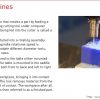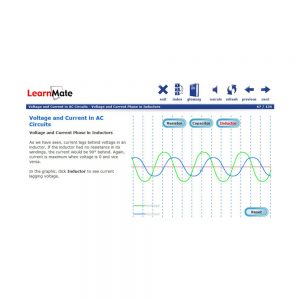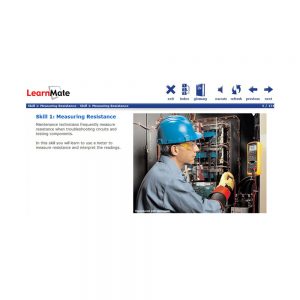Industrial Maintenance
Showing all 5 results
-
E-Learning/Modules
Electric Circuits
EA01A: Electric Circuits features skills-based curriculum and hands-on activities with industrial-grade components. Students build a solid foundation in electrical circuits.
EA01A: Electric Circuits delivers the skills needed for success in industrial maintenance careers, including:
Lockout/tagout & safety procedures
Connecting an electric circuit
Measuring voltages and currents in an electric circuit
Testing power sources like batteries, thermocouples and PV cellsIncluded
Flexponent panels:
E040: Switch, Lamp and Buzzer Panel
E045: Sources of Electricity Panel
E047: Heat/Light Source Panel
E151: Series/Paralell Lamp Panel
E152: Transformer/Adjustable Power Panel
Digital Multimeter (Fluke Model 115 or equivalent)Requirements
(sold separately)
JobMaster Learning Station
Power Control Panel: PC04 (120V)
Each JobMaster module includes the listed hardware and panels to add to your JobMaster Training station, as well as skills-based curriculum.All modules require a JobMaster Training Station, sold separately.
Some modules also require hardware and/or panels purchased as part of prerequisite skill blocks in the same series, as noted on each product data sheet.Skills Acquired
Skill 1: Lockout/Tagout
Skill 2: Connecting a Basic Circuit
Skill 3: Identifying Switches
Skill 4: Connecting a Momentary Switch
Skill 5: Connecting a Toggle Switch
Skill 6: Identifying Sources of Electricity
Skill 7: Measuring DC Voltage
Skill 8: Constructing a Series Circuit
Skill 9: Constructing a Parallel Circuit
Skill 10: Applying DC Voltage Principles
Skill 11: Testing an Electrolytic Cell
Skill 12: Testing a Battery
Skill 13: Testing a Thermocouple
Skill 14: Testing a Solar Cell(0 reviews) -
E-Learning/Modules
Introduction to Advanced Manufacturing
Introduction to Advanced Manufacturing provides students an excellent overview of the field of advanced manufacturing. This 15-hour course engages students by means of hands-on activities and compelling online curriculum that includes:
-
- a comprehensive overview of the manufacturing field, processes and career choices.
- multi-level activities in career seeking and planning a manufacturing company.
- a capstone project that challenges students to follow all the steps of the manufacturing process to produce a product.
For students on a career track in mechatronics, automation and advanced manufacturing, Introduction to Advanced Manufacturing serves as an excellent launching pad for more in-depth courses. Exploratory students with little exposure to the field may decide to pursue an advanced manufacturing career after learning of the many exciting opportunities available!
Introduction to Advanced Manufacturing is part of the Foundations of Advanced Manufacturing series, which teaches the introductory skills essential for success in advanced manufacturing careers.
Foundations of Advanced Manufacturing is ideal for any engineering or automated manufacturing program, providing a thorough and engaging element of STEM (Science, Technology, Engineering and Mathematics) education.
-
- Introduction to Advanced Manufacturing includes everything you need for successful blended learning.
- Through LearnMate®, essential resources are provided for both students and teachers.
- Students are always one click away from glossaries and help files available on each page.
- Teachers have instant access to handouts, tips and detailed activity instructions.
- Learn more about the Foundations of Advanced Manufacturing series!
With Introduction to Advanced Manufacturing as the cornerstone, the Foundations of Advanced Manufacturing courses are an excellent launching point for more in-depth mechatronics, automation and advanced manufacturing courses.
Course Outline
-
- Introduction
- Careers in Manufacturing
- Seeking a Manufacturing Career (Activity)
- The Manufacturing Company
- Planning and Staffing a Manufacturing Company (Activity)
- Manufacturing Processes
- Computers in Manufacturing
- Automation in Manufacturing
- The Arrow Plane (Project)
(0 reviews) -
-
Basic Power Electricity
LCR Circuits
EA01C: LCR Circuits features skills-based curriculum and hands-on activities with industrial-grade components. Students delve into the relationships between electrical properties such as inductance, capacitance and reactance.
EA01C: LCR Circuits delivers the skills needed for success in industrial maintenance careers, including:
Determining Capacitance
Assembling an Electromagnet
Inducing Voltage
Operating TransformersIncluded
Flexponent panels:
E029: Magnetism Demonstration Panel
E043: Capacitance Panel
E044: Inductance Panel
E057: Motor/Generator Demonstration Panel
E150: Relay/Contactor PanelRequirements
(sold separately)JobMaster® Learning Station
Power Control Panel: PC04 (120V)
Prerequisite courses:
Electrical Circuits (EA01A)
Resistors and Conductors (EA01B)
Digital Multimeter (Fluke Model 115 or equivalent)
Each JobMaster® module includes the listed hardware and panels to add to your JobMaster® Training station, as well as skills-based curriculum.All modules require a JobMaster® Training Station, sold separately.
Some modules also require hardware and/or panels purchased as part of prerequisite skill blocks in the same series, as noted on each product data sheet.Skills Acquired
Skill 1: Discharge a Capacitor
Skill 2: Testing a Capacitor
Skill 3: Determining Capacitance
Skill 4: Applying Capacitance Principles
Skill 5: Applying Magnetic Principles
Skill 6: Inducing a Magnetic Field
Skill 7: Assembling an Electromagnet
Skill 8: Applying Electromagnetic Principles
Skill 9: Inducing Voltage
Skill 10: Inducing DC Voltage
Skill 11: Assembling & Operating Transformers(0 reviews) -
Basic Power Electricity
Motors and Generators
EA01D: Motors and Generators features skills-based curriculum and hands-on activities. Students students gain a complete understanding of the practical operation of motors, generators and phase relationships.EA01D: Motors and Generators delivers the skills needed for success in industrial maintenance careers, including:Operating AC and DC Generators
Operating a Series Motor
Reactance and Impedance
Three-Phase PowerComponents Required (sold separately):
JobMaster® Learning Station
Power Control Panel: PC04 (120V)
Prerequisite Courses:
Electrical Circuits (EA01A)
Resistors and Conductors (EA01B)
LCR Circuits (EA01C)
Each JobMaster® module includes the listed hardware and panels to add to your JobMaster® Training station, as well as skills-based curriculum.All modules require a JobMaster® Training Station, sold separately.
Some modules also require hardware and/or panels purchased as part of prerequisite skill blocks in the same series, as noted on each product data sheet.Skills Acquired
Skill 1: Operating a PMDC Motor
Skill 2: Operating a DC Generator
Skill 3: Operating an AC Generator
Skill 4: Operating a Series Motor
Skill 5: Reactance and Impedance
Skill 6: Applying Phase Relationship Principles
Skill 7: Three-Phase Power
Skill 8: Measuring AC Voltage(0 reviews) -
Basic Power Electricity
Resistors and Conductors
EA01B: Resistors and Conductors features skills-based curriculum and hands-on activities with industrial-grade components. Students learn to measure resistance when troubleshooting circuits and testing components, a necessity for accomplished technicians.
EA01B: Resistors and Conductors delivers the skills needed for success in industrial maintenance careers, including:
Measuring resistance
Calculating and measuring wire size
Determining losses in a wire
Drawing resistor symbolsIncluded
Flexponent panels:
E042: Resistance PanelRequirements
(sold separately)
JobMaster® Learning Station
Power Control Panel: PC04 (120V)
Digital Multimeter (Fluke Model 115 or equivalent)
Each JobMaster® module includes the listed hardware and panels to add to your JobMaster® Training station, as well as skills-based curriculum.Skills AcquiredSkill 1: Measuring Resistance
Skill 2: Measuring Resistance in Series Circuits
Skill 3: Measuring Resistance in Parallel Circuits
Skill 4: Drawing and Reading Resistor Symbols
Skill 5: Testing an Adjustable Resistor
Skill 6: Measuring Wire Size
Skill 7: Applying Resistance and Wire Size
Skill 8: Calculating Wire Size
Skill 9: Determining Losses in a Conductor(0 reviews)








